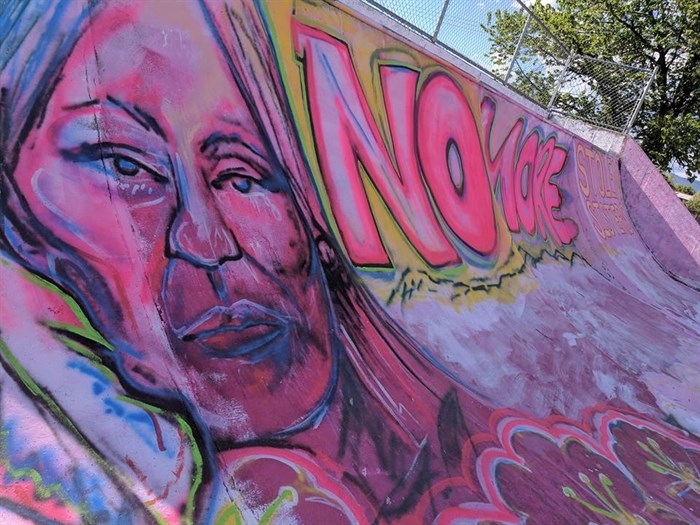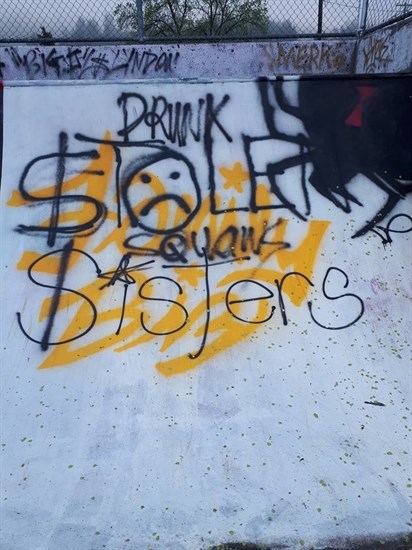
This mural painted by artist Isha Jules was meant to honour missing and murdered indigenous women. It was vandalized with racial slurs sometime on May 9, 2018.
Image Credit: Jody Leon
May 11, 2018 - 6:30 PM
ENDERBY - Slurs about indigenous people spray-painted at a local skateboard park where a mural honouring murdered and missing women was once showcased is certainly racist, but may not be a crime under current laws, police say.
The B.C. Hate Crimes Unit was called this week to assist the Enderby RCMP with its investigation. Before last week, the skateboard park featured a mural created to raise awareness about missing and murdered women, including several who disappeared in the North Okanagan. It contained the words: No more stolen sisters. Earlier this week, the mural was painted over with white and black paint, perhaps innocently by local youth and unrelated to new graffiti that appeared to mock the mural with slurs.
The investigation has, essentially, two main components. First is graffiti or mischief and the other is an assessment of whether it fits the definition of a hate crime and neither looks likely.
Const. Gareth Blount is one of two officers on B.C.’s Hate Crimes Team and was notified of the Enderby incident by the Vernon branch of the Organization Against Racism and Hate.
“In looking at the language, it’s racist, derogatory, it’s not in any way associated with good or positive things, in fact it’s very negative,” Blount says of the vandalism.
But hate crime legislation is quite specific in Canada. It applies to hate propaganda, public incitement of hatred and mischief relating to religious property. It’s unlikely this situation applies.
The graffiti? Sgt. Janelle Shoihet, media relations officer for the B.C. RCMP, says that’s not the case either.
“I understand that tagging in (the) skate park in Enderby, where the vandalism took place, is permissible by the City of Enderby. This means that no offence or crime has been committed,” Shoihet says.

Image Credit: River Johnson
As of May 10, local RCMP in the North Okanagan said the investigation into the racist graffiti was ongoing. It is unclear whether the investigation will continue if the graffiti is deemed lawful. We are seeking updates and clarification.
While visible, reported incidents in Enderby and the North Okanagan are rare, B.C. is no stranger to hate crimes and racially motivated crimes. In 2016, Statistics Canada reported 211 hate crimes in B.C., up from 164 the year before. Across the country just over 1,400 hate crimes were reported in 2016, the last year for available statistics, 47 more than in 2015.
Police-reported hate crimes against indigenous people accounted for roughly two per cent, or 30 incidents, across the country. Both Statistics Canada and the Hate Crimes Unit admit not all cases are reported to police. According to Blount, latest research suggests the main reasons people don’t report are mistrust of the police, not wanting to bother police, or thinking it’s too trivial.
“Some want to keep it private because they’re embarrassed about it,” Blount says.
His team is trying to change that. They are trying to overcome those barriers by building relationships with community members and encouraging people to report complaints when they see racism.
“There’s so many incidents we hear of where people don’t come forward and it’s very hard to backtrack and get any evidence because it may have happened a while ago,” Blount says.
He says the team wants to build trust with First Nations populations so they feel comfortable reporting incidents of hate. Police can’t change the specifics of hate crime legislation, but even if a crime doesn't fit the definition, their investigation can be meaningful. Police can recommend that sentencing judges take into account crimes that are motivated by hate, prejudice or bias against an identifiable group. If accepted as an aggravating factor, it can lead to harsher sentences.
“I do think there are incidents not reported to police. I think whatever that reason is, we need to change that. We are hopefully going to break down any mistrust between us,” Blount says. “We’re trying to look within ourselves to see what we can change to get that to happen.”
He says hate motivated crimes come with grave ripple effects felt across communities.
“Hate crimes are difficult in that they affect the victim, and the smaller community of people they know, and the larger community of the identified group from which the victim is from, and also the whole community suffers because it can create divide, which then is a problem that can last for years,” Blount says.
The graffiti has since been painted over again and a new mural is expected.
Learn more about the Hate Crimes Team here. Call 911 to report a hate crime.
To contact a reporter for this story, email Charlotte Helston or call 250-309-5230 or email the editor. You can also submit photos, videos or news tips to the newsroom and be entered to win a monthly prize draw.
We welcome your comments and opinions on our stories but play nice. We won't censor or delete comments unless they contain off-topic statements or links, unnecessary vulgarity, false facts, spam or obviously fake profiles. If you have any concerns about what you see in comments, email the editor in the link above.
News from © iNFOnews, 2018